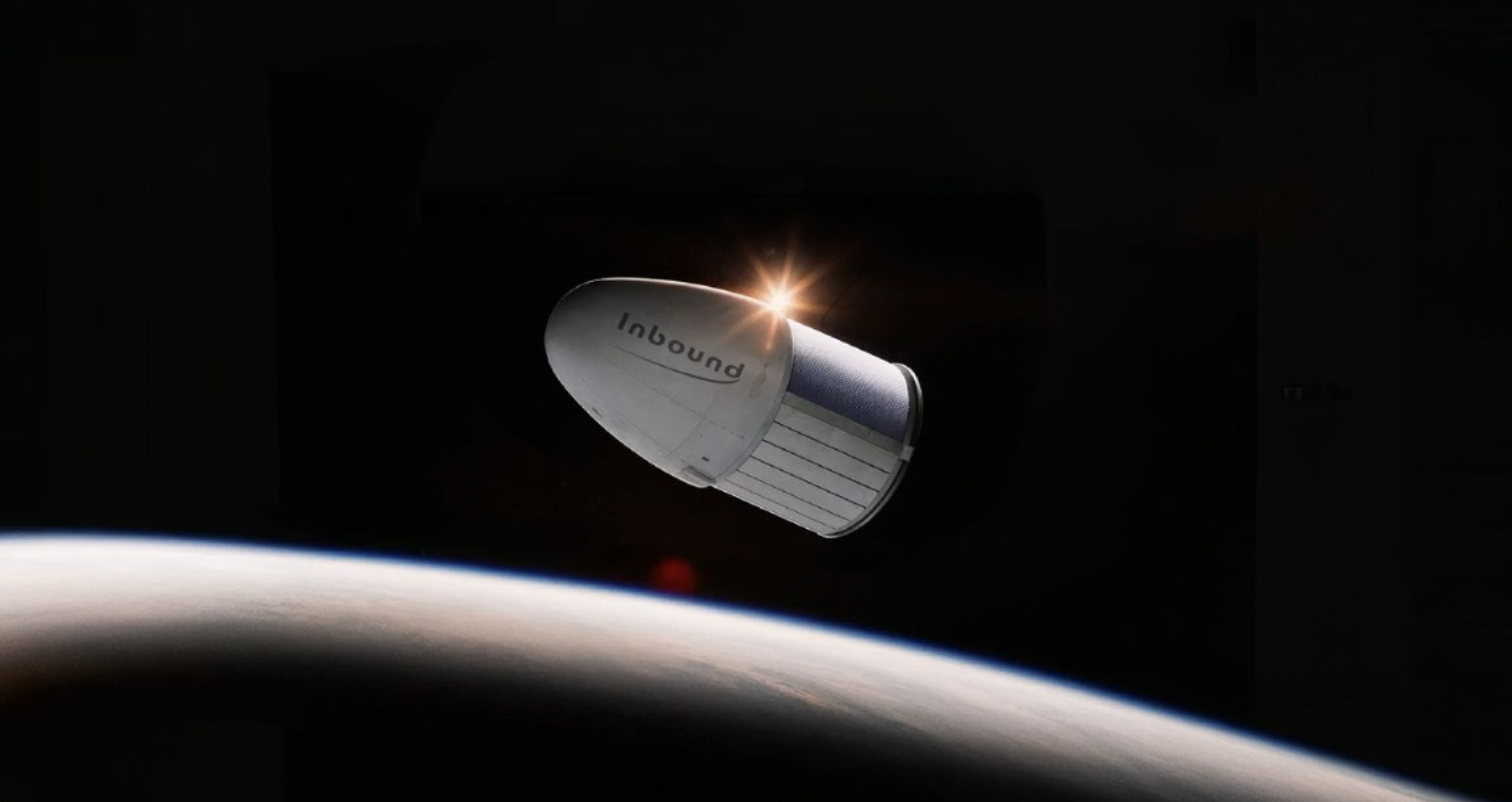The Next Frontier: Industrializing Space
For the last two decades, the space industry has been laser-focused on one thing: getting to space cheaper and faster. And we’ve made remarkable progress — launch costs have dropped exponentially. Today, access to space is no longer the bottleneck.
But a new bottleneck has emerged.
The challenge now is what happens after you get to space. How do you move cargo or humans within space? How do you maintain, repair, and utilize the infrastructure we’re building in orbit? How do you bring back manufactured goods from space economically?
This is the next frontier: not just reaching orbit, but enabling seamless movement within it. True industrialization of space begins with mobility.
This underscores our excitement for Inbound’s Reusable Space Plane - designed for frequent, affordable, and safe reentry missions.
Spaceplanes — The Missing Link in the Orbital Economy
Today’s rockets are optimized for delivery. They launch satellites, ferry cargo, and send astronauts into orbit. But they aren’t designed for mobility. They can’t hop between orbits, perform in-space servicing, or return to Earth regularly without heavy refurbishment or cost.
Spaceplanes offer an elegant solution to this. They:
- Stay in orbit for days to months.
- Re-enter and land on conventional runways.
- Are reusable with minimal turnaround time.
- Can transport cargo, humans, and scientific payloads.
- Serve both civil and defense applications.
They’re the equivalent of reusable delivery trucks for space — built for flexibility, cost-efficiency, and high-frequency operations.
Microgravity Pharma — A Wedge Market with Astronomical Potential
Inbound’s first commercial beachhead is microgravity pharmaceutical manufacturing.
Why?
Because some of the world’s most valuable and complex drugs benefit from being made in space. Microgravity enables better protein crystallization, higher purity, and new therapeutic pathways — especially for cancer drugs, monoclonal antibodies, and mRNA vaccines.
This is not theoretical. Companies like Varda have already returned drug payloads from orbit and proven the market potential. Pfizer made over $75 billion from its COVID vaccine — the amount of mRNA needed to generate that revenue would fill just two milk jugs. That’s the kind of high-value, low-mass product that makes space manufacturing viable and extremely attractive.
Inbound is positioning itself as the platform layer in this ecosystem — enabling frequent, reliable return of such high-value payloads from space, starting with pharma.
The Dual-Use Advantage — Commercial + Defense Synergy
Every transformational space company has had a strong dual-use play. SpaceX’s Starlink funds its rocket ambitions. The U.S. government has played a pivotal role in subsidizing that growth — to the tune of $15B+.
Inbound’s architecture unlocks similar dual pathways:
- Commercial: Microgravity research, return of pharma payloads, materials testing.
- Defense: Hypersonic glide testing, ISR, reentry R&D, and strategic payload recovery.
Reusable spaceplanes with precise reentry and short turnaround times will be critical for both national security and the commercial space economy. Inbound’s design and team are built with this in mind.
Why We Backed Inbound
We first met the Inbound team at IIT Madras Nirmaan and were immediately struck by their clarity of thought, technical rigor, and sense of urgency. This is what convinced us:
- The Market Timing: With rockets commoditized and in-space infrastructure accelerating, mobility is the next bottleneck. Inbound is early, but timed right.
- The Founding Team:
Aravind is a deep technologist with a strong focus on hardware and vehicle design. During his PhD at the National Centre for Combustion Research and Development (NCCRD), he conducted extensive research on fluid dynamics in microgravity environments — grounding Inbound’s design in real-world physics and academic depth.
Capt. Abhijit (ex-Indian Navy) brings rare operational depth from decades at the cutting edge of military aviation. As a test pilot, he regularly flew at speeds approaching Mach 2, pushing the boundaries of human flight. He also played a pivotal role in the Indian Navy’s procurement of MiG-29 fighter jets, giving him deep insight into defense systems and strategic acquisitions — critical for Inbound’s dual-use roadmap.
Vishal brings sharp strategic thinking and a strong focus on market traction. He holds a Master’s in Management Science and Engineering from Columbia and has worked at Tesla’s Gigafactory, gaining hands-on experience in operations, supply chain, and business development. His commercial acumen complements the team’s technical depth, making for a well-rounded founding trio. - The Product Differentiation: Inbound’s wingless, lifting-body architecture combines aerodynamic efficiency with low structural complexity — ideal for India’s low-cost R&D base. The design also enables runway landings without the need for complex wing systems, and offers better volumetric efficiency, making it well-suited for compact payload return and orbital servicing missions.
They’ve approached this the right way — staying lean, bringing on top technical advisors (including veterans from ISRO’s Human Spaceflight Programme), and engaging early with potential customers and global regulators to align design with real-world demand.
What’s Next
There are many challenges ahead. Reentry vehicles are incredibly hard to engineer. Materials, GNC, thermal protection systems, regulatory pathways — all require time, capital, and precision.
But we believe Inbound is approaching it the right way:
- Designing from first principles
- Leveraging India’s aerospace base
- Staying agile on GTM
- Building for dual-use demand
As investors, we’re excited to support them with capital, customer connections, regulatory support, and global exposure — from defense corridors in India to accelerator programs in Japan and Europe.
India’s Spaceplane Bet
Inbound Aerospace represents a generational opportunity for India to lead in a new category of space infrastructure — reusable vehicles that go up, stay up, and come back safely.
From launching to landing, India has talent. And with Inbound, we now have a company bold enough to go after the hardest problem in the orbital economy.
We are proud to be the first believers in Inbound Aerospace and look forward to helping them build India’s reusable path to space - for the world.
Look up. The journey back has just begun. 🚀🚀🚀

_________________________________________________________________
About Speciale Invest
Founded in 2017 by visionary partners Vishesh Rajaram and Arjun Rao, Speciale Invest is a seed-stage venture capital firm dedicated to backing deep tech founders solving complex global challenges. We invest early — at the pre-seed and seed stages — and partner closely through the zero-to-one journey with capital, strategic guidance, business development, and hiring support.
Our focus spans six transformative themes:
- Energy Transition & Planetary Health
- Advanced Manufacturing & Industrial Modernization
- Beyond Earth & Space Technology
- Advanced Software, Computing & AI
- Biosciences, Life Sciences & Healthtech
- Defence & Secure Systems
We thrive in the risk and complexity of pre-product deep tech ventures and are proud to champion globally relevant companies built from India. Explore our portfolio here.
If you’re building something ambitious in deeptech or deepscience, we’d love to hear from you: info@specialeinvest.com
We are Speciale Invest - #TheDeepTechVC


